u12 soccer practice plans pdf
- by stefanie
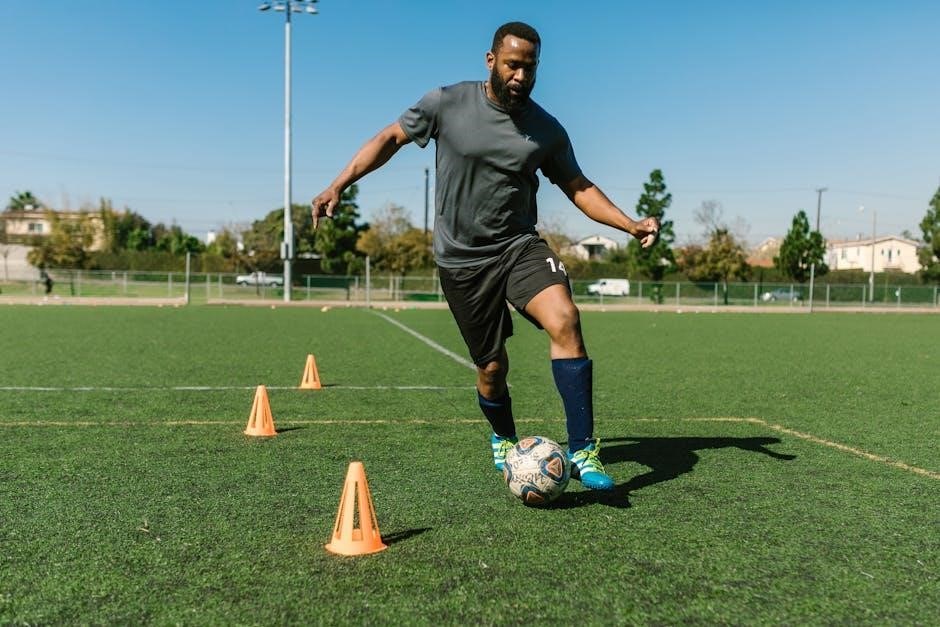
Structured practice plans are essential for U12 players, focusing on skill development, tactical awareness, and physical conditioning. A well-designed plan ensures consistent improvement and engages young athletes effectively.
1.1. Understanding the Importance of Structured Practice Plans
Structured practice plans are vital for U12 soccer players, as they provide a clear framework for skill development, team cohesion, and tactical understanding. These plans ensure that each training session is purposeful and aligned with the team’s goals. By organizing drills and activities systematically, coaches can address specific aspects of the game, such as passing, dribbling, and decision-making. A well-structured plan also promotes consistency, allowing players to build on previous lessons and progress gradually. Moreover, it helps coaches assess player improvement and adapt training to meet the team’s evolving needs. Ultimately, structured plans create a focused and productive training environment, essential for fostering both individual growth and team success.
1.2. Age-Specific Considerations for U12 Players
U12 players, typically aged 10-12 years, are in a critical developmental phase, requiring practices tailored to their physical, mental, and emotional growth. At this stage, players experience rapid physical changes, improving coordination and endurance. Practices should focus on refining fundamental skills while introducing more complex tactics. Mentally, they can grasp basic strategies but still thrive on positive reinforcement and clear instructions. Emotionally, building confidence and teamwork is crucial. Coaches must balance technical drills with fun, engaging activities to maintain motivation. Additionally, practices should incorporate injury prevention exercises, such as dynamic warm-ups and strength training, to support their growing bodies. Understanding these age-specific needs ensures practices are both challenging and enjoyable, fostering long-term development in young players.

Key Characteristics of U12 Soccer Players
U12 players exhibit refining technical skills, improved coordination, and growing tactical understanding. They demonstrate increased physical endurance, basic decision-making abilities, and a stronger sense of teamwork and sportsmanship.
2.1. Physical Development and Coordination
U12 players typically exhibit significant improvements in physical development and coordination. At this stage, they refine fundamental movement skills like balance, agility, and speed. Their growing strength and endurance enable more dynamic participation in drills and games. Coordination is crucial for soccer-specific movements, such as dribbling, shooting, and passing. Practice plans often include exercises to enhance these abilities, ensuring players can perform complex actions with precision. Coaches emphasize proper technique to prevent injuries and foster long-term athletic development. As players mature physically, their ability to execute skills under game-like conditions improves, making coordination a cornerstone of their progress. Structured practices help maximize these advancements, preparing them for more competitive play.
2.2. Tactical Awareness and Decision-Making
At the U12 level, tactical awareness becomes a focal point as players begin to understand game dynamics. They learn to read the field, identify space, and make informed decisions. Coaches introduce basic strategies like maintaining possession, creating scoring opportunities, and defending effectively. Small-sided games and situational drills are used to simulate real-game scenarios, fostering problem-solving skills. Players develop the ability to recognize when to pass, shoot, or dribble, enhancing their decision-making under pressure. Tactical exercises also emphasize teamwork and positional awareness, helping players contribute to collective success. As their understanding grows, they become more effective in executing plays and adapting to different game situations, laying a strong foundation for advanced tactical concepts in the future.
2.3. Emotional and Psychological Readiness
Emotional and psychological readiness is crucial for U12 players, as they develop confidence, resilience, and a growth mindset. Coaches play a key role in fostering a positive environment that encourages players to embrace challenges and learn from mistakes. Building self-esteem through positive reinforcement helps players stay motivated and focused. Teaching emotional regulation techniques, such as managing frustration or excitement, prepares them for competitive situations. Additionally, instilling a sense of responsibility and teamwork helps players understand their role within the squad. Coaches should also emphasize the importance of sportsmanship and respect for opponents, fostering a love for the game while promoting mental toughness and adaptability. These elements collectively contribute to the holistic development of young athletes, both on and off the field.

Components of a U12 Soccer Practice Plan
A well-rounded U12 practice plan includes warm-up, technical skill development, tactical exercises, and cool-down. Each session should balance age-appropriate activities to ensure engagement and progress.
3.1. Warm-Up and Preparation
A proper warm-up is essential to prepare U12 players for practice, reducing injury risk and enhancing performance. Begin with dynamic stretches like high knees, leg swings, and arm circles to increase blood flow and flexibility. Incorporate light cardio, such as jogging or shuttle runs, to elevate heart rates. Transition into ball control drills, like dribbling through cones or figure-eight maneuvers, to improve coordination and focus. Small-sided games or possession drills can also be introduced to simulate match scenarios. Keep the warm-up engaging and age-appropriate, lasting 15-20 minutes. This preparation phase sets the tone for a productive session, ensuring players are mentally and physically ready for skill development and tactical exercises.
3.2. Technical Skill Development
Technical skill development is a cornerstone of U12 soccer practice plans, focusing on improving players’ ability to control and manipulate the ball. Drills should emphasize dribbling, passing, shooting, and ball control, using exercises like cone mazes, wall passes, and small-sided games. Incorporate activities that promote precision, such as short passing drills with varying foot surfaces, and encourage players to use both feet. Shooting drills should target different areas of the goal, teaching accuracy and power. Ball control exercises, like toe taps and figure-eight dribbling, enhance coordination and confidence. Progressively increase difficulty by adding defenders or time constraints. Small-sided games (e.g., 3v3 or 4v4) allow players to apply skills in game-like scenarios, fostering decision-making and creativity; Positive feedback and demonstrations are key to helping players refine their techniques effectively.
3.3. Tactical Exercises and Small-Sided Games
Tactical exercises and small-sided games are vital for developing U12 players’ understanding of the game. These activities simulate match scenarios, focusing on decision-making, spatial awareness, and teamwork. Small-sided games like 3v3 or 4v4 encourage creativity and problem-solving while applying technical skills. Tactical drills, such as 2v1 breakaways or defensive shape exercises, teach players to recognize and exploit spaces. Incorporate scenarios like corner kicks or free kicks to practice set-pieces. Player rotations and varied game formats keep practices engaging. These exercises build game intelligence, improve communication, and prepare players for competitive situations. They also foster adaptability, allowing players to apply skills in dynamic, unpredictable environments, essential for developing a well-rounded soccer IQ and a competitive edge.
3.4. Cool-Down and Review
A proper cool-down is essential to conclude U12 soccer practices, helping players gradually lower their heart rates and prevent muscle soreness. Begin with light jogging or walking, followed by static stretches targeting major muscle groups like hamstrings, quadriceps, and calves. Incorporate gentle movements to improve flexibility and promote recovery. After stretching, use this time to review the session’s key points, highlighting successes and areas for improvement. Encourage players to reflect on their performance and ask questions. Provide positive feedback and actionable tips for skill development. End the practice on a motivational note, reinforcing teamwork and effort. This structured approach ensures players leave with a clear understanding of their progress and goals for the next session.
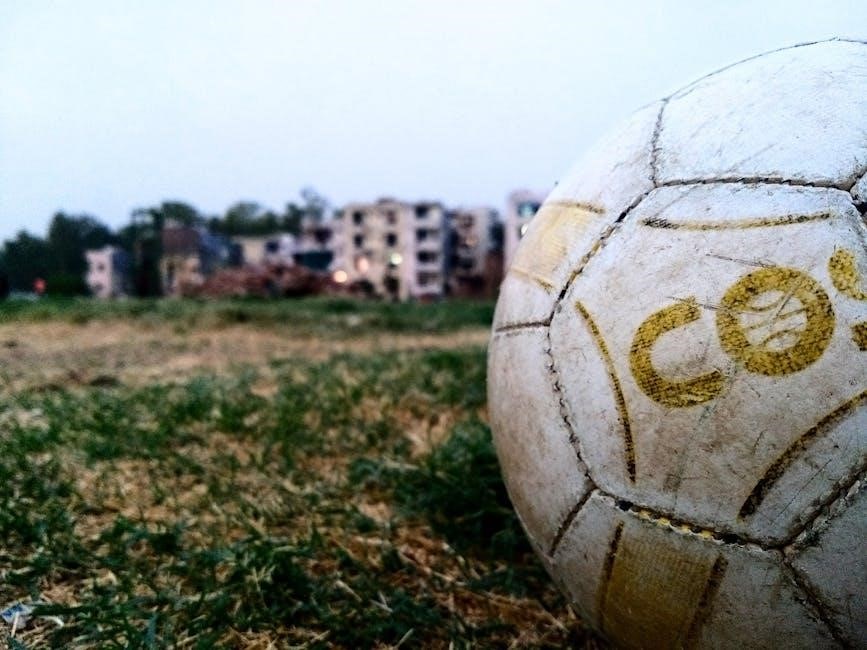
Age-Specific Training Methods
U12 soccer training focuses on age-appropriate techniques, balancing technical skills with tactical awareness. Drills are designed to enhance coordination, decision-making, and teamwork, keeping sessions engaging and developmental.
4.1. Skill Development Drills
Skill development drills for U12 players are designed to enhance technical proficiency in areas such as dribbling, passing, receiving, and shooting. These drills focus on repetition and precision, allowing players to master fundamental skills in a controlled environment. For example, passing drills might involve short, accurate passes in pairs or small groups, gradually increasing distance and complexity. Dribbling exercises often include cone mazes or zigzag runs to improve ball control and agility. Shooting drills emphasize proper technique and accuracy from various distances. Coaches use these drills to identify and correct technique, ensuring players build a strong foundation for more advanced play. The goal is to create confident, skilled players who can apply these skills effectively in game situations.
4.2. Game Awareness and Positional Play
Game awareness and positional play are critical for U12 players to understand their roles and make effective decisions during matches. Drills focus on spatial awareness, movement, and communication. Small-sided games like 3v3 or 4v4 encourage players to recognize opportunities and responsibilities in different positions. Coaches use exercises that simulate game scenarios, such as maintaining possession or transitioning quickly between defense and attack. Players learn to read the game, anticipate opponents’ moves, and coordinate with teammates. These activities enhance their ability to think critically and execute strategies effectively, preparing them for more complex team play as they progress in the sport.
4.3. Physical Conditioning and Injury Prevention

Physical conditioning for U12 players focuses on building endurance, strength, and agility while preventing injuries. Drills include dynamic stretching, shuttle runs, and plyometric exercises to improve flexibility and coordination. Coaches emphasize proper warm-up routines and cool-down stretches to reduce muscle strain. Injury prevention techniques involve teaching players correct landing, cutting, and movement mechanics. Age-appropriate conditioning ensures players develop without overtraining. Incorporating balance exercises and core strengthening activities helps enhance overall stability. Coaches also educate players on hydration, nutrition, and rest to maintain optimal physical health. This approach ensures young athletes build a strong foundation while minimizing the risk of injuries, allowing them to enjoy the game safely and effectively.

Sample U12 Soccer Practice Plan
A sample U12 soccer practice plan includes structured drills, age-specific exercises, and small-sided games. These plans are designed to be engaging and balanced for young athletes.
5.1. Practice Plan 1: Passing and Receiving
This practice focuses on improving passing accuracy and receiving skills. Begin with a 10-minute warm-up, including dynamic stretches and light ball work. Next, conduct unopposed passing drills, such as short ground passes and wall ball exercises. Gradually introduce movement and pressure to simulate game situations. Incorporate small-sided games like 3v3 or 4v4 to apply skills in a competitive setting. Dedicate 15 minutes to game-awareness exercises, emphasizing spatial recognition and decision-making. Conclude with a 5-minute cool-down, reviewing key takeaways. This plan balances technical development with fun, ensuring players build confidence and teamwork. Adapt drills based on player feedback to maintain engagement and progress.
5.2. Practice Plan 2: Dribbling and Ball Control
This practice emphasizes improving players’ ability to control and maneuver the ball effectively. Begin with a 10-minute warm-up, incorporating dynamic stretches and ball manipulation drills. Next, set up cone mazes or zigzag courses for players to navigate, focusing on inside cuts, outside cuts, and step-overs. Progress to unopposed dribbling exercises, such as figure-eight drills around cones. Introduce pressure by adding defenders in 1v1 or 2v1 scenarios, encouraging players to use moves like the inside cut, outside cut, and step-over. Conclude with a 10-minute small-sided game (3v3 or 4v4) to apply skills in a competitive environment. End with a 5-minute cool-down, reviewing key techniques and encouraging creativity on the ball.
5.3. Practice Plan 3: Shooting and Finishing
This practice focuses on improving players’ shooting technique and finishing accuracy. Begin with a 10-minute warm-up, including dynamic stretches and light ball control exercises. Set up shooting stations with cones or small goals, starting with unopposed shots from various angles and distances. Progress to drills like “Breakaway Challenge,” where players dribble toward the goal and shoot under pressure. Incorporate volleys and half-volleys to simulate game-like situations. Add a 3v3 or 4v4 game with an emphasis on scoring opportunities. Conclude with a 5-minute cool-down, reviewing proper shooting form and encouraging confidence in front of the goal. This plan develops both power and precision, helping players become clinical finishers.

Progression and Adaptation in Practice Plans
Progression involves increasing drill difficulty, while adaptation focuses on adjusting plans based on player feedback and seasonal goals to meet the team’s evolving needs effectively.
6.1. Increasing Difficulty of Drills
Increasing drill difficulty is crucial for U12 players to advance their skills. Coaches can enhance challenges by adding defenders, reducing space, or incorporating game-like scenarios. This gradual progression ensures players are prepared for competitive matches while maintaining engagement and motivation.
6.2. Adapting to Player Feedback and Needs
Adapting practice plans based on player feedback is vital for effective coaching. Coaches should regularly assess player progress and adjust drills to meet individual and team needs. This ensures sessions remain challenging yet achievable, fostering growth and engagement.
Utilizing tools like downloadable PDF templates and coaching software allows for seamless modifications. Player feedback can highlight areas needing attention, enabling coaches to tailor practices dynamically; This approach not only enhances skill development but also boosts player confidence and overall performance.
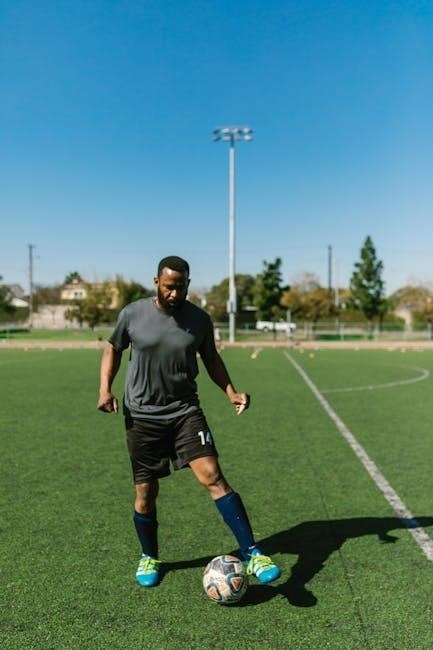
Measuring Success in U12 Soccer Practices
Success is measured through skill improvement, team cohesion, and player feedback. Coaches assess progress in technical abilities, decision-making, and collaboration, ensuring practices align with player development goals effectively.
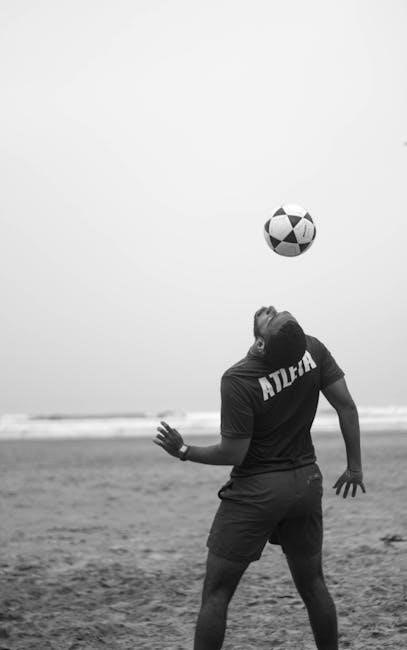
7.1. Assessing Skill Improvement
Assessing skill improvement in U12 players involves evaluating technical abilities like dribbling, passing, and shooting. Coaches use drills and small-sided games to gauge progress, ensuring each player meets developmental benchmarks. Feedback is provided to enhance performance, fostering growth and confidence. Regular evaluations help track improvements over time, allowing for tailored practice adjustments. By focusing on individual and team skills, coaches ensure a well-rounded development approach, preparing players for competitive play while maintaining a fun and engaging environment. This structured assessment supports long-term player growth and team success, aligning with practice plans designed for U12 age groups.
7.2. Evaluating Team Cohesion and Communication
Evaluating team cohesion and communication in U12 soccer involves observing how players interact during drills and games. Coaches assess collaboration, verbal and non-verbal communication, and problem-solving abilities. Teamwork exercises, such as passing sequences or small-sided games, reveal how well players coordinate and support each other. Positive communication, like encouraging teammates or calling for the ball, is emphasized. Coaches also monitor conflict resolution and mutual respect among players. Feedback is provided to strengthen bonding and improve on-field dynamics, fostering a united and cooperative team environment. This focus ensures players develop not only as individuals but also as cohesive unit, enhancing overall performance and enjoyment of the game.
7.3. Gathering Player and Parent Feedback
Gathering feedback from players and parents is crucial for refining U12 soccer practice plans. Coaches distribute surveys or hold meetings to understand player experiences and parental insights. Players provide input on practice effectiveness, engagement levels, and areas for improvement. Parents share observations on skill development, team dynamics, and overall satisfaction. This feedback helps coaches adjust drills, communication strategies, and practice structures. Open dialogue fosters trust and collaboration, ensuring practices meet the needs of all participants. By actively listening to feedback, coaches can make data-driven decisions, enhancing the quality of training sessions and the overall soccer experience for U12 players.
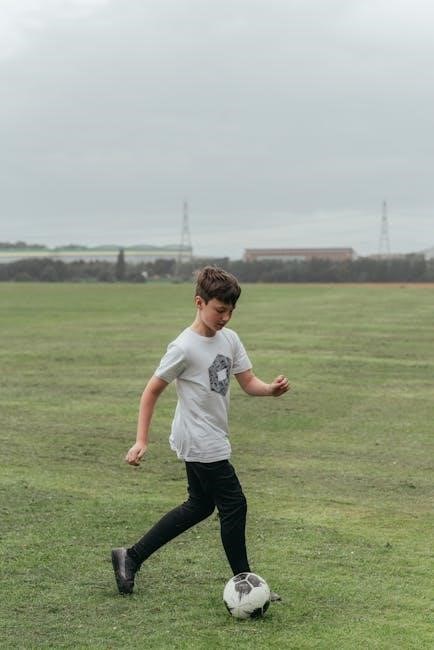
Resources and Tools for U12 Soccer Coaches
Coaches can utilize downloadable PDF templates, online forums, and software to create structured practice plans tailored to U12 players’ needs, enhancing efficiency and organization.
8.1; Downloadable PDF Templates
Downloadable PDF templates are invaluable resources for U12 soccer coaches, offering pre-designed practice plans that cover essential skills like passing, dribbling, and shooting. These templates provide structured sessions, drills, and progress tracking, saving coaches time and ensuring comprehensive development. Many templates are tailored to specific age groups, focusing on age-appropriate exercises that enhance technical, tactical, and physical abilities. For example, the Ontario Soccer Association’s “Learn to Train” practice plan includes detailed drills for possession and technical skills. Coaches can customize these templates to meet their team’s needs, making them adaptable and flexible. Accessing these resources helps coaches deliver organized and effective training sessions, fostering player improvement and team success.
8.2. Online Coaching Communities and Forums
Online coaching communities and forums provide U12 soccer coaches with a wealth of resources and support. Platforms like US Soccer forums and grassroots development groups offer discussions on practice plans, skill development, and age-specific training methods. Coaches can share ideas, download templates, and gain insights from experienced professionals. For example, the Ontario Soccer Association’s forums highlight drills for possession and technical skills, while other communities focus on adapting practice plans to player needs. These spaces foster collaboration and continuous learning, helping coaches refine their strategies and stay updated on best practices. Engaging with these communities ensures access to diverse perspectives and tools, enhancing the quality of training sessions for young players. They are invaluable for coaches seeking to improve and innovate their approach to U12 soccer development.
8.3. Software for Creating Custom Practice Plans
Software tools are invaluable for U12 soccer coaches to design and customize practice plans. Platforms like Coach’s Clipboard and soccerdrills.net offer drag-and-drop features to create visual drills and share them with players and staff. These tools often include libraries of pre-designed drills, allowing coaches to tailor sessions to their team’s needs. Some software also enables real-time adjustments, ensuring practices remain dynamic and engaging. Additionally, apps like Soccer Coach Weekly provide downloadable PDF templates, making it easy to structure sessions focused on specific skills like passing, shooting, or positional play. These resources help coaches save time, enhance organization, and deliver structured, age-appropriate training plans that align with U12 player development goals. They are essential for modern coaches aiming to maximize efficiency and effectiveness in their training sessions.
Effective U12 soccer practice plans promote skill mastery, tactical understanding, and physical development while fostering teamwork and enjoyment, ensuring young players grow into confident, capable athletes.
9.1; Recap of Key Elements in U12 Soccer Practice Plans
A successful U12 soccer practice plan integrates skill development, tactical awareness, and physical conditioning while maintaining player engagement and fun. Key elements include structured warm-ups, technical drills, and small-sided games to enhance decision-making and teamwork. Coaches should adapt plans to meet individual and team needs, ensuring a balance between improvement and enjoyment. Incorporating feedback and progressive challenges helps players grow confidently. Utilizing resources like downloadable PDF templates or online coaching tools can streamline planning. Emphasizing safety, hydration, and positive reinforcement creates a supportive environment. Ultimately, effective practice plans lay the foundation for long-term player development and a lifelong passion for the sport.
9.2. Encouraging Continuous Improvement and Fun
Encouraging continuous improvement and fun is vital for U12 players, fostering a love for the game while developing skills. Coaches should create engaging practices with varied drills and games to maintain excitement. Positive reinforcement through praise and constructive feedback motivates players to strive for excellence. Incorporating fun activities, such as small-sided games and skill challenges, keeps sessions lively and competitive. Encouraging player input and adapting plans to their interests ensures ownership and enjoyment. Celebrating milestones, no matter how small, builds confidence and teamwork. By blending improvement with enjoyment, coaches help players grow both on and off the field, creating a positive and lasting soccer experience.
Related posts:
Download free U12 soccer practice plans PDF! Packed with fun drills, skills training, and strategies to develop young players.
Posted in PDF